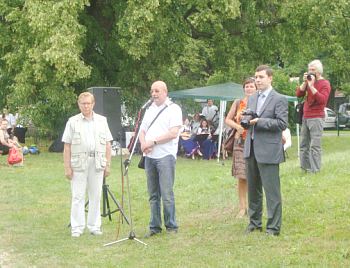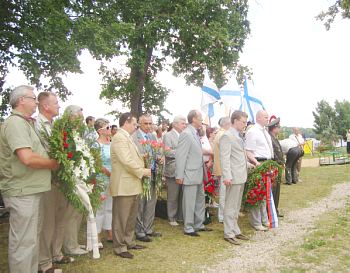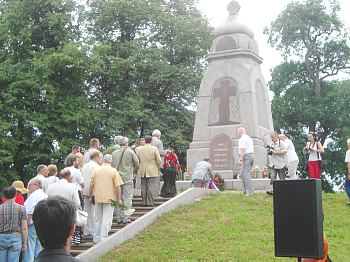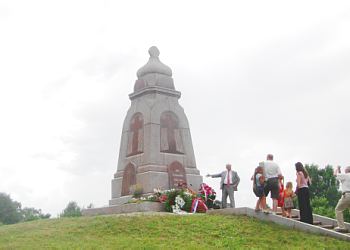Laying the flowers at the Monument on Lucavsala Island

With the initiative of Riga Business Club, and participation of the Embassy of Russia in Latvia, on the 11th July there was held a ceremony of laying flowers at the monument to Russian soldiers died in Lucavsala in 1701.
Mr. Evgeny Voloshin, Riga Business Club, opened the short ceremony. Mr. V.Altuhov told the public about the events happened in this place 310 years ago.
Tragic incident in the local history happened in the beginning of the Great Northern War, when Swedes gained the victory over Saxons, and decided to get rid of Russians, who eventually were left on the island without any help. Swedish army was bigger in size, and therefore hoped to win easily, but that didn’t happen. The turmoil was so big that even Karl XII came over, and then saw lots of his soldiers died and injured, and twenty of Russian soldiers there in the redoubt shooting at their enemies. The king was inspired by their braveness so much that ordered not to kill them, but to capture only. The other Russian soldiers, who were already killed in the fight, were buried at the first fraternal cemetery in Riga. The Ambassador of Russian Federation in Latvia H.E. Mr. Aleksandr Vieshnakov, the Counsellor of the Embassy of Russia Mr. Evgeny Tikhonov and other diplomats took part in the ceremony of laying flowers at the monument.
The Ambassador of Russian Federation in Latvia H.E. Mr. Aleksandr Vieshnakov, the Counsellor of the Embassy of Russia Mr. Evgeny Tikhonov and other diplomats took part in the ceremony of laying flowers at the monument.  For a long time in that place there were windmill ruins with the sign in German telling that near here there was a burial of Russian soldiers. The monument, which stands in this place these days, was built with the initiative of Mr.Zinovjev, Governor-General of Lifland on public donations. The six meters high monument reminds an orthodox chapel, and is made from the Finnish granite From one side there is a monogram of Peter the Great with the date 1701, and from the other side words of Aleksandr III and the year 1891. The text on the monument says :
For a long time in that place there were windmill ruins with the sign in German telling that near here there was a burial of Russian soldiers. The monument, which stands in this place these days, was built with the initiative of Mr.Zinovjev, Governor-General of Lifland on public donations. The six meters high monument reminds an orthodox chapel, and is made from the Finnish granite From one side there is a monogram of Peter the Great with the date 1701, and from the other side words of Aleksandr III and the year 1891. The text on the monument says :
„On 10th July 1891 this monument should be built on the donations of the Governor-General M.A. Zinovjev. In the memory of 400 Russian soldiers killed on 10 July 1701 defending the Island.“


 Appeal to world leaders and humanity
Appeal to world leaders and humanity
